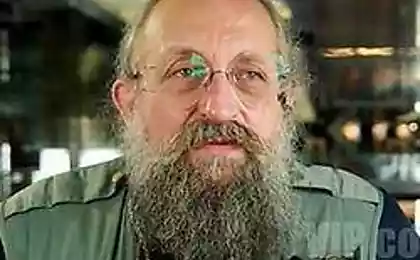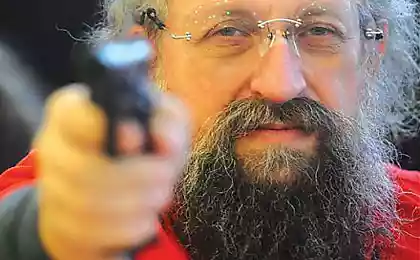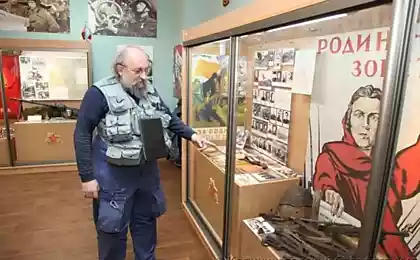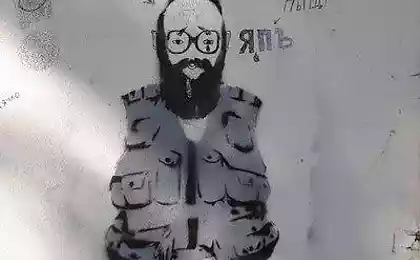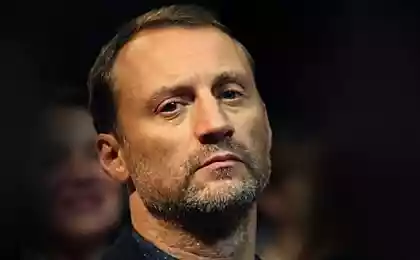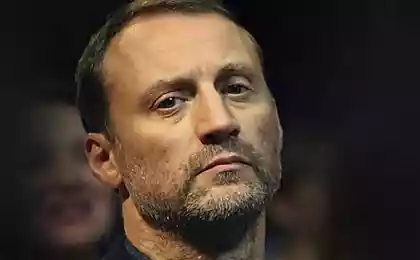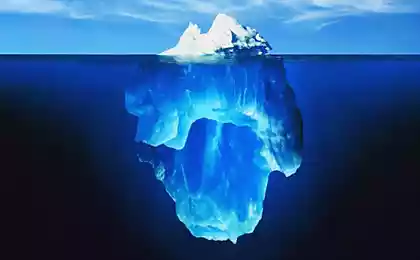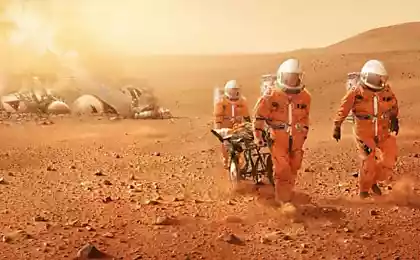Anatoly Wasserman: the future, intelligence and socialism
Anatoly Wasserman widely known in Russia. Leave your mark on the Russian-language Internet folklore as "Onotole", which became the subject of numerous jokes and anecdotes, he continues to maintain a sense of humor and sharpness of mind.
Especially for our blog Habré, we decided to interview Anatoly Alexandrovich, to talk with the famous intellectual of IT, science, memory, and even future policy.
- Anatoly, at one time you were a programmer. Is it still alive hobby, whether you're writing the program right now? B> i>
No, unfortunately, the last line of code I wrote in the summer of 1995, and now belong exclusively to the computer as a user. While advanced users. That is my general view of programming to help me better understand what it means provide action programs that I work with, and it can sometimes imagine how best to achieve them what I need. Blockquote> - But since 1995, the year a lot has changed! i>
But the basic principles remain. Actually, the main principle of programming is clear: arbitrarily complex task can be broken into pieces, so simple that they will cope anyone. Since then, nothing has changed. And this principle is not only in programming. Blockquote> - How do you think will develop programming in the coming decade? B> i>
As far as I can judge from what I have seen articles and books on programming, the main direction is now the same as the trunk was at that moment when my programmer career has ended. This object-oriented programming, where the program is collected from the structures containing both the data and methods of their processing.
I remember the official announcement of the Algol-68, "every action described in this report, can be replaced by any other action that gives the same external effect". This fundamental concept, in my opinion, still long enough to remain one of the key programming. Just as before the key was the idea of structured programming, i.e. the very difficult problem of decomposition into elementary parts, but to apply primarily to the methods of treatment, and only then to the data structures.
But the fact that now there was a set of software tools to present objects as graphics and draw connections between them, of course, convenient - but it is only a technical detail design all of the same core ideas. So I think, in the foreseeable future is unlikely that anything will change. Blockquote> - Thanks to the Internet and the "collective wisdom" there were such things as frameworks, open source-projects, etc. In this direction, something changes? B> i>
I believe that in the foreseeable future, the main direction in the organization of large programming teams will work with the open source community. Why is that? First, the classic collective programming of a single leader, who gathered around the performers his instructions, only works to a limited extent. Even in the book "The Mythical Man-Month" discussed in some detail why such an arrangement, since the level of a number of employees, adding new employees only slow you down. So, working with open source allows to parallelize not only the programmer's job, but also many things associated with her organization - when by themselves lining up teams of several people interacting on each specific task, and chief designer can only accept or reject put forward solutions. In the case of rather complex and extensive project work with open source allows to increase productivity faster than the version with a single head.
Since I had a few years to manage a small team of five programmistok, I imagine about how the increasing complexity of coordination as the number of employees. I believe that the spontaneous formation of small groups that are emerging when working with open source, produces, ultimately, lower overhead costs. Judging from the fact that Linux is now developing much faster than Windows with a comparable number of developers doing anything meaningful, such a path promising. Blockquote> - Does your great memory in your daily life but wins intelligent show? i>
It really helps. First of all, my main work - journalism. When the right during the writing of this article, I can not remember the good examples illustrating it, it greatly speeds up the work. Even though for the details, I still climb in the book or on the Internet. But a good memory makes it easier to fold the big picture. I must say that a good memory - it is, above all, associative thinking. As many observations and experiments, a person remembers everything that passes through his senses, and the question is not whether to remember and to remember. And it helps a lot abundance associations. The more, the greater the chance that some of these associations you at the right time remove the desired fragment of memory. Blockquote> - Do you somehow train your memory? B> < / i>
No, I never trained specifically memory, and even never resorted to some mnemonic device. Is that the number of E and P memorize mnemonic. For the same Pi, with an accuracy sufficient for nearly all significant settlements, running a simple "poem»:
It is only necessary to try
and remember things as they are:
three, fourteen, fifteen,
ninety-two and six.
But this is an exception. I associative thinking, and every time I come across something new, I'm starting to look for associations that already knew before.
But it's not just associations. There is an interesting thing, which I always speak and write - the whole picture of the world. That is the view of the world as a result of the interaction of some - quite simple - fundamental laws. If you are able to deduce consequences of these laws, you already know about the world a lot. As two and a half centuries ago, one of the founders of the French encyclopedia Helvetius, knowledge of certain principles successfully compensates ignorance of some facts. When you have in mind the whole picture of the world, any new fact finds its place in this picture, is tied to it and automatically acquires a variety of associations, so that it and remember after that much easier.
Until the mid-1970s, all the education in the world is developing towards the formation of the whole picture of the world and acquiring skills in working with her. Unfortunately, then the direction of the development of education has been reversed. The fact that the whole picture of the world is very convenient for its support, but it is very inconvenient for those who want to manipulate him. If a fact does not fit into a coherent picture of the world, it immediately raises suspicions. And it is not always due to the fact that the very fact erroneous. It also happens that the picture of the world is wrong.
For example, 10 years ago, I had to revise its picture of the world in terms of economy and politics. This part of me has been built on the basis of liberalism and libertarianism, ie the teachings of the beneficial unrestricted political and economic freedoms of the individual without any regard for society. But accumulated a lot of facts that do not fit into this picture, and I was forced to admit: I have it wrong. By the way, now I have quite a lot of publications, and where I point to specific errors of these doctrines, and to the fundamental causes of these errors. So the work has been very useful. I think if I did not have the whole picture of the world, then I would probably just did not pay attention to the facts and not be engaged in a revision. Man, which is the whole picture of the world, much less amenable to commercial and political advertising, it is much more difficult to cheat. So now both the market and politics with all its might aim to bamboozle mankind, the destruction of the whole picture of the world.
It creates a new educational system, preventing the emergence of the idea of the possibility of the formation of this pattern. To counter this while you can, unfortunately, only on an individual basis. In particular, I recommend everyone to read and ponder four books:
Friedrich Engels - "Anti-Dühring», Stanislaw Lem - "Sum of technologies», Richard Dawkins - "The Blind Watchmaker», < David Deutsch - "The structure of reality».
By the way, for me personally, the formation of the whole picture of the world began to read at the age of 9-10 years old children's encyclopaedia. Now, all 10 volumes of the first edition are available on the Internet. Recently, I have them, just in case, downloaded to your archive. Children's Encyclopedia, unlike adults, are not built on the principle of vocabulary and thematically, which contributes to a whole picture of the world.
Subsequently, Khrushchev and Gorbachev's promotion broke me of the paintings dedicated to the social sciences. I had to shape it anew, and now I'm pretty close to the picture formed in my childhood. I was convinced: for all the technical amendments to the progress of Marxism to this day remains a good approximation to the reality of the social sciences, and it makes sense to focus on it.
Just a couple of days ago there was, finally, in the sale of my book, entitled "The socialism is better than capitalism." It is mainly articles from the "Business Magazine", where I consider first of all what the limitations of information technology have contributed to the emergence of the benefits of capitalism over socialism and to what point these restrictions will disappear. By the way, it will happen fairly soon. Approximately in 2020, the year will be more favorable to capitalism, socialism, by all indicators, without exception, with it thanks to the development of information technology. In addition, the articles examined many aspects of the upcoming transition to a new socialism. At the end of the book is developed by me and my colleagues in the research program, which must hold to this transition to get the most painless. To no one was hurt and nothing is lost. According to rough estimates, for these studies need to involve experts such quality and in such quantity that will require funding in the amount of one million dollars a month for 5 years. Naturally, out of pocket, I can not pull that kind of money - they are he has never happened. But I hope that the book will help the financing of the output of the complex tasks. Blockquote> - A purpose of this study will be an idea of a strategic development plan for Russia? B> i>
There is no strategic plan for development. The bottom line is that starting around 2020. (under very adverse scenario - a 2022-th, but not later), a total processing power of computer park, connected to the Internet, will allow to calculate the complete, accurate and optimal plan for total world production less than a day.
But this will be possible only in the case of common ownership of the means of production. As with socialism. And this, in turn, means it is necessary to think in advance what to offer each owner in return of his property, so he agreed to such a transition.
Secondly, it is necessary to solve the problem of goal-setting, that is not the plan development, and the main goal for which we all work. There is reason to believe that this algoritmiziruemaya task. That is, it can not decide on the level of personal discretion, and with the analysis of a large array of heterogeneous data.
In this case, the main difficulty was in heterogeneity of data, up to fiction. Algorithms can be developed by means of the theory of reflection. But this theory, firstly, developing half a century, and secondly, its founder, Vladimir Lefebvre, for more than a quarter of a century ago, I moved to Irvine. That is, most of the experts in the theory of reflection is now lives in California. Refer to them it can only be based on the already allocated funding.
In addition, there is a wide range of psychological problems to be solved before the start of the above-described transition to minimize the preconditions for the inevitable conflict. I must say that all the known disadvantages of the old socialism somehow stem from the limited capacity of the then information technology. Now these capabilities multiply wider, so that those disadvantages is not repeated. But there are a number of other shortcomings which need to be addressed in advance. In particular, it is clear what kind of psychological problems will arise in the new society, and it is clear that these problems can be solved, but it is not yet known exactly how.
Work on a unified plan, in the general interest, there is a much more effective when everyone is able to realize the common interests and the need for unity plan. A fragmentation of views and interests just means that people do not work in the general interest, and in someone's private. Therefore, the system aimed primarily at the general interest, will contribute to the revival of a very complete picture of the world and maximize the intellectual and creative abilities of each person. Especially creative abilities - because now when you try to implement some creative ideas you will surely encounter the need to do much more, spend too much time. And speaking of the planned system, able to work out any innovation for the day, it would remove a very serious obstacle in the way of creativity.
Accordingly, in the new society, creative activity will demand a lot more than it is now. I emphasize: we are talking about the real creativity, but not about its simulation when you are just trying a new way to combine the fruits of someone else's creativity. Not the so-called creativity: although she translated it as creativity, but in our case was the symbol for a variety of simulation methods. Real creative work in the new society will demand much more than the old. And intelligence in the new society will demand much more.
Since we're talking about intelligence: it is possible that in the near future there will be some chemical compounds or manipulation of the genetic code, to significantly increase the IQ of the average person. If you increase the intellectual potential of society, methods of manipulation, based on the fragmentation of thinking and to concealing information, will not be much effective. And then the question arises - where to go? If a person is so smart, he does not see the interest in some routine work, and robots that can work in the mills and factories, have not yet been created, then any serious socio-economic problems.
Robots for many of the activities are not created just because a person is less a robot. With the development and every individual and society as a whole will have a very powerful economic incentive to create robots. As Engels pointed out, when there is a need of society, it moves science forward more than ten universities. I believe in the new environment automation of production will rise considerably. As for IQ, I do not expect that the growth of intelligence society reduce the level of fraud. It will grow and the IQ scam. In addition, as the vast experience, an intelligent man, in fact, can be fooled with the same ease as a fool - you just slip him some bait.
In particular, both here and in the Maidan damn lot of people, intelligent all objective indicators. But this does not prevent them very sincerely believe that the return of people to the power emitted from there because they have already proved their professional incompetence, can somehow improve the situation in the country. Moreover, I have often observed how very smart people can easily peck at the bait such simple that even the least bad fish swam by. Unfortunately, the intelligent person, the more stupid he is able to come up with. And I do not expect that the mass of mankind poumnenie itself deliver us from deception. This requires a completely different means - including the direct and deliberate fight against fraud, including the Criminal Code.



